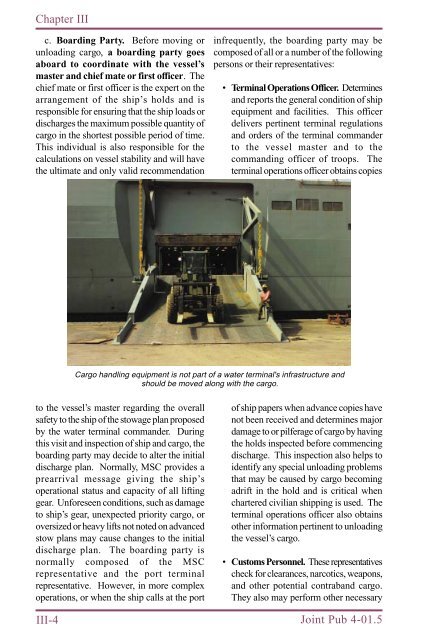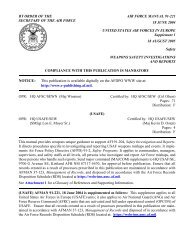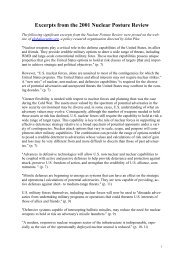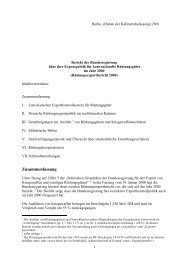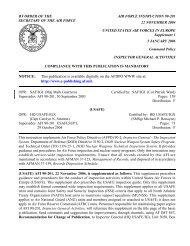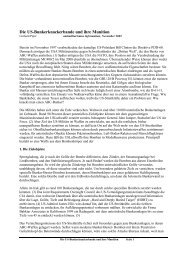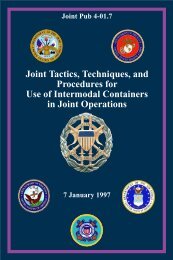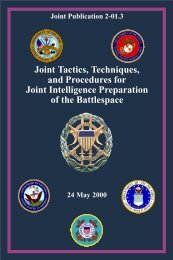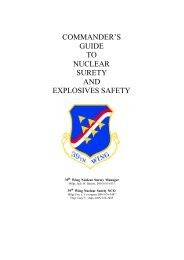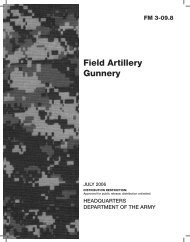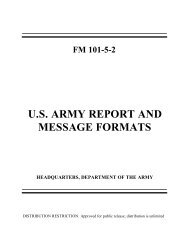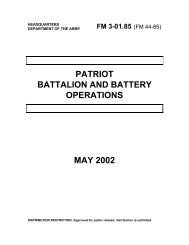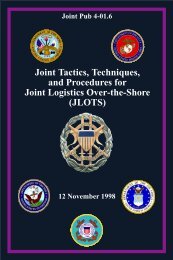JP 4-01.5 JTTP for Water Terminal Operations - BITS
JP 4-01.5 JTTP for Water Terminal Operations - BITS
JP 4-01.5 JTTP for Water Terminal Operations - BITS
You also want an ePaper? Increase the reach of your titles
YUMPU automatically turns print PDFs into web optimized ePapers that Google loves.
Chapter III<br />
c. Boarding Party. Be<strong>for</strong>e moving or<br />
unloading cargo, a boarding party goes<br />
aboard to coordinate with the vessel’s<br />
master and chief mate or first officer. The<br />
chief mate or first officer is the expert on the<br />
arrangement of the ship’s holds and is<br />
responsible <strong>for</strong> ensuring that the ship loads or<br />
discharges the maximum possible quantity of<br />
cargo in the shortest possible period of time.<br />
This individual is also responsible <strong>for</strong> the<br />
calculations on vessel stability and will have<br />
the ultimate and only valid recommendation<br />
to the vessel’s master regarding the overall<br />
safety to the ship of the stowage plan proposed<br />
by the water terminal commander. During<br />
this visit and inspection of ship and cargo, the<br />
boarding party may decide to alter the initial<br />
discharge plan. Normally, MSC provides a<br />
prearrival message giving the ship’s<br />
operational status and capacity of all lifting<br />
gear. Un<strong>for</strong>eseen conditions, such as damage<br />
to ship’s gear, unexpected priority cargo, or<br />
oversized or heavy lifts not noted on advanced<br />
stow plans may cause changes to the initial<br />
discharge plan. The boarding party is<br />
normally composed of the MSC<br />
representative and the port terminal<br />
representative. However, in more complex<br />
operations, or when the ship calls at the port<br />
III-4<br />
infrequently, the boarding party may be<br />
composed of all or a number of the following<br />
persons or their representatives:<br />
• <strong>Terminal</strong> <strong>Operations</strong> Officer. Determines<br />
and reports the general condition of ship<br />
equipment and facilities. This officer<br />
delivers pertinent terminal regulations<br />
and orders of the terminal commander<br />
to the vessel master and to the<br />
commanding officer of troops. The<br />
terminal operations officer obtains copies<br />
Cargo handling equipment is not part of a water terminal's infrastructure and<br />
should be moved along with the cargo.<br />
of ship papers when advance copies have<br />
not been received and determines major<br />
damage to or pilferage of cargo by having<br />
the holds inspected be<strong>for</strong>e commencing<br />
discharge. This inspection also helps to<br />
identify any special unloading problems<br />
that may be caused by cargo becoming<br />
adrift in the hold and is critical when<br />
chartered civilian shipping is used. The<br />
terminal operations officer also obtains<br />
other in<strong>for</strong>mation pertinent to unloading<br />
the vessel’s cargo.<br />
• Customs Personnel. These representatives<br />
check <strong>for</strong> clearances, narcotics, weapons,<br />
and other potential contraband cargo.<br />
They also may per<strong>for</strong>m other necessary<br />
Joint Pub 4-<strong>01.5</strong>


